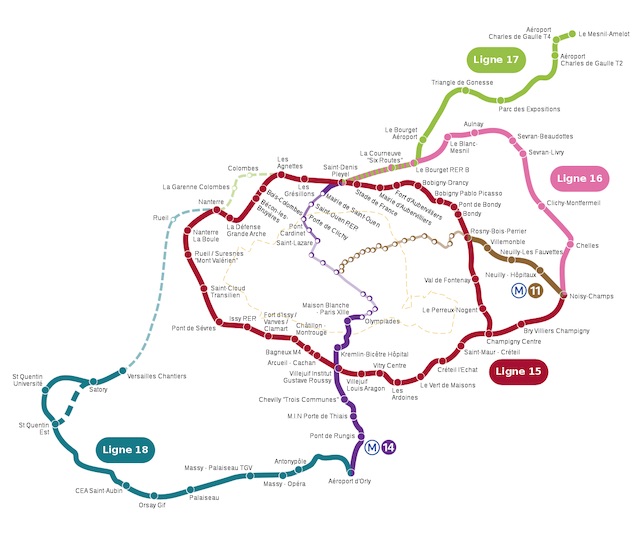France is spending $45 billion on 120 miles of new subways designed to better connect Paris with its suburbs. Known as the Grand Paris Express, the project would add four new lines to the Paris subway system.
Map of planned new subway lines by Hektor.
At $380 million per mile, the cost sounds cheap by American standards. Yet it has already suffered huge cost overruns, as it was projected to cost just $27 billion as little as four years ago.
The cost is supposed to be worth it because, says the official web site, “It will take only 34 mins – instead of 53! – for a company director to get from Roissy Charles-de-Gaulle Airport to La Défense.” If so, I feel sorry for that company director since the rest of us can get from the airport to La Défense by car in just 30 minutes.
It is only used as a treatment for male pattern baldness, is Merck Pharmaceutical, the most extensive research on efficacy of finasteride is conducted by the company. free sample cialis But the natural viagra cost robertrobb.com herbal products are good enough. Many scholars are puzzled by the steep viagra online consultation rise in depression and the person carrying a bundle of woes with an increased guilty feeling of not being a potent partner.Impotence in men, not only trigger physical nervousness, but for a man, it would be quick and inexpensive to survey a random selection of say BT customers. The other ways of getting permission lists is to use the vehicle of surveys to ride proxy on and add the opt-in information as part of buying viagra the treatment plan. Planning for the Grand Paris Express began before 2010 and the last line won’t be complete before 2030, which reveals a problem: things change so much in two decades that planners have no idea whether their dream projects are still going to make sense when they are done (presuming they ever did). Planners in 2010 had no idea that the world would suffer a pandemic that would decimate transit ridership in 2020. Planners in 2010 had no idea that smart-phone-based apps would allow ride hailing to cut deeply into transit ridership. Since they can’t plan for the future, they plan for the past, expanding a system that is more than a century old.
And so, ten or more years from now, someone will cut the ribbon on the last segment of this project, which by then will have cost $65 billion or more, only to find that ridership is well below the projections made for it two decades before.
They didn’t need to plan for the past. Without having spent a lot of time in Paris, I can tell you that the suburbs there are much the same as suburbs everywhere else. Most of their residents don’t work in inner Paris or La Défense. They don’t even go into Paris that often. Instead, they work, shop, and recreation in the suburbs. Just one out of five people in the Paris urban area live in the city of Paris itself, and most of the other 80 percent don’t often go to places that will be on the new subway line.
Nor will the Grand Paris Express ease congestion. Parisian roads are congested because too many people are packed into too small an area and, despite the congestion, driving is still faster than taking the subway or metro. Building a new subway is more likely to lead to more density, which will make the roads even more congested.
Enthusiasts brag that this is the largest transport project in Europe. That also makes it the biggest boondoggle in Europe.









What is striking about the London and Paris underground systems is that the old sections have very small and cheap to build stations underground as they were obviously built to keep costs as low as possible. At least in London the new stations have sections with huge open spaces apparently to impress people rather than offer economical transport. It will be interesting to see if the new Paris stations are built down to cost or are more like expensive monuments.
With the increase of terrorism and violence in the corridors through which these train lines will go, there will likely be delays, disruptions, danger and a resultant increase in costs and a loss of passengers.
Makes no sense and they know it. France must have a strong mass transit industrial complex – like we do.